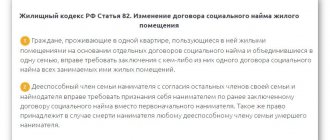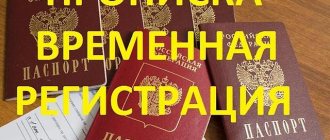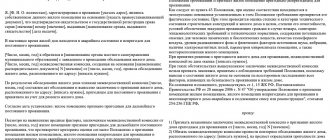What is fictitious registration of a person at his place of residence?
Registration is a form of notification to government agencies about a person’s place of residence. Despite its serious differences from registration, it is also mandatory and does not imply voluntariness.
Fictitious registration is a type of registration in which the owner of square meters or the registered person provides deliberately false information. It can be expressed in the provision of false forms or distorted personal data. Fictitious registration also means registration in which the registered person does not intend to live in the premises.
The opposite situations often occur, in which the owner of the living space refuses to provide the registered person with access to the premises. This is also considered a violation and recognizes the registration as fictitious.
The essence of registration is the need to live at the registration address . This allows you to maintain statistical, legal, migration and other types of records.
Responsibility
Fictitious registration is not a new concept. It has always been practiced in dealing with certain problems, but until 2013, this violation was subject to administrative liability, which significantly reduced the risks of both the owner and the registered owner. But since the beginning of 2013, the offense has been reclassified and toughened, in accordance with the law “on rubber apartments.” It began to be classified as a criminal act and is regulated by Article 322.2 of the Criminal Code of the Russian Federation.
If the fact of illegal registration is confirmed, the perpetrators are punished:
- A fine of 100 to 500 thousand rubles or the amount of income of the culprit for three years.
- Forced labor for up to 3 years. Additionally, deprivation of the right to hold certain positions for up to 3 years may be awarded.
- Imprisonment for up to 3 years, also with or without restriction of activities.
Punishment threatens both parties to the illegal transaction. In this case, it does not matter whether the registration is permanent or temporary.
When can you avoid responsibility and how to do it?
In paragraph 3 of Article 322.2 of the Criminal Code of the Russian Federation there is a note that explains in what cases a person can avoid criminal punishment. Two grounds for exemption from liability are given - facilitating the disclosure and the absence of corpus delicti in the actions.
Based on the current judicial practice, it can be argued that an offense will not entail consequences if:
- The registered person lives in the same locality where he is registered.
- Permanent and temporary registration is located in Moscow, St. Petersburg or their regions.
- Persons staying in the premises without the appropriate registration permit are close relatives or spouses of the owner.
Those who contributed in every possible way to solving the crime and are not convicted of criminal intentions towards the second participant in the fictitious transaction will not be held accountable.
What is fictitious registration?
The answer to this question is contained in Law No. 5242-1 of June 25, 1993. The second part of this law defines fictitious registration.
Legislation recognizes registration as fictitious in several cases:
- If it was received using false documents.
- If the holder of such registration did not plan to live in the specified living space in advance. Registered at one address, but lives at another.
- If the owner or tenant of the apartment indicated by the person gave consent to formal registration without further residence of the person in the apartment, or did not give it at all.
In Russia, fictitious registration is considered a crime . This is reflected in Article 322.2 of the Criminal Code of the Russian Federation.
You can be held liable under this article by registering Russian citizens or foreigners as your host, knowing in advance that they will not live in your apartment. Violation of the rules is punishable by a fine of 100 to 500 thousand rubles , or imprisonment or correctional labor for up to 3 years.
ATTENTION! The same article of the Criminal Code provides mitigation for persons who will assist the investigation in the investigation of a crime and on the condition that their actions cannot be seen as part of it.
Such people could be, for example, defrauded landlords in large cities, into whose apartments migrants from neighboring countries have registered.
Is it possible to verify registration and on what grounds?
Registration, in addition to the actual inconvenience during its registration, also has a number of positive aspects. Thus, a registered person may qualify for a number of benefits and subsidies valid in the territory of the specified territorial district. For foreign citizens, registration generally opens all doors . They can find employment, receive medical care and much more.
Registration verification is not widespread. You shouldn’t be afraid that government officials will come to every apartment to inspect it. Typically, registration is checked based on identified facts. The basis for inspections may be complaints or requests from third parties. Only representatives of authorized bodies can verify the authenticity of registration (where and how can one obtain information about the permanent residence address?).
Who initiates the review?
The initiators of verification of registration and its compliance with reality may be:
- Employees of territorial bodies of the Ministry of Internal Affairs . When keeping records, they record the number of persons registered in one room. If there are too many people listed in the apartment according to the papers, a check is carried out.
- Citizens can apply for an inspection on their own initiative if they suspect that a criminal scheme is being used.
- Employers when hiring an employee. This is especially often practiced when registering foreigners.
In all cases, the procedure requires a formally submitted request for verification. If it is satisfied, verification actions are carried out.
How do they do it?
Representatives of law enforcement agencies and/or employees of territorial bodies of the Ministry of Internal Affairs have the right to carry out an actual inspection. When visiting a residential premises, they must have with them an official order to carry out inspection actions. The owner of the property, as well as the registered owner, are required to provide identification documents to the inspectors. These include a stamped passport or registration certificate, rental agreement and other forms.
If there is no registered person at the place of registration, you must make sure that he really does not live here.
To do this, the premises are inspected to find his personal belongings (clothes, shoes, equipment, etc.). Neighbors are also interviewed. If necessary, the check can be performed a second time.
How is it declared illegal?
The fact of registration can be recognized as fictitious only in court . Law enforcement officials prepare a set of documents that prove the illegality of registration and send it to the court. The court, in turn, notifies the defendant of the claim, giving him the opportunity to present counterarguments and defend himself.
During the meetings, documents submitted by one or both parties are reviewed. The result is a final verdict.
How to prove legality?
The fictitiousness of registration is quite difficult to prove unless the registered and/or owner has been convicted of deliberate unlawful acts and the provision of false documents. Often the accused themselves can officially confirm that registration is illegal. This should not be done, because the need to prove guilt lies with law enforcement agencies, and violators, on the contrary, must look for an opportunity to drop the charges.
You can prove the legality of registration as follows::
- By providing a rental agreement.
- By writing an explanatory note outlining the factual situation.
And remember, living within the same locality is not a violation.
Is it possible to be somewhere other than where you live?
On the one hand, the law recognizes registration without the intention of living in the specified apartment as fictitious.
On the other hand, the same 1993 Law states that if a citizen moves within one subject of the federation, or moves from the Moscow region to Moscow, then this frees him from the obligation to register again.
If we look at this situation not from a legal, but from a practical point of view, then the attention of law enforcement agencies is focused mainly not on citizens of the Russian Federation, but on foreigners, including those from neighboring countries. Therefore, if you, living in a regional center, are registered in another district of the same region, you should not expect troubles from the FMS.
If you arrive in another subject of the federation and do not go through the registration procedure, expect that you will be required to pay a fine of up to five thousand rubles. Without leaving your region, you don’t have to be afraid of anything.
You will find even more nuances about registration in our materials. Read about living without registration at your place of residence, as well as what the penalty is for not having this mark.
How many people can register in an apartment without suspicion?
Previously, registration meant the presence of a mandatory square footage for one person. Thus, the number of residents was limited to reasonable limits. Registration records do not have established boundaries in relation to the size of the premises and the number of persons registered in it. But this does not mean that any number of citizens can be registered. If there are too many people, this will be a reason to check the living space.
Not a single legislative norm provides an answer to the question - how many people should be registered in the premises of a particular quadrature. Therefore, when registering, you should only assume that everyone registered is required to live in the apartment.
Illegal registration for foreigners - methods of fraud
The largest number of fictitious registrations are for foreigners . When they come to the Russian Federation, they cannot find a job or receive other benefits without registration. Meanwhile, they have neither relatives nor friends, so they look for registration in other ways, most often through advertisements and on the Internet.
The most common fraud schemes are services provided by special companies. They have production of certificates on stream. The foreigner pays a certain amount of money, for which he is given a certificate of temporary registration. The fictitiousness of the form is most often discovered during employment.
Not everyone can recognize a skillful fake at first glance. Therefore, the easiest way to check the form for authenticity is directly at the territorial office of the Ministry of Internal Affairs .
To register at a new place of residence, for example, after changing your registration, you will need to perform a number of actions and prepare a package of documentation. To ensure that the procedure does not cause difficulties, it is worth familiarizing yourself with the main points of its implementation in advance. Is registration required for the owner of a purchased apartment and how to register in a studio or apartment, we discussed in our materials.
You can get into an unpleasant situation with fictitious registration records either intentionally or without realizing your actions. You can avoid criminal liability during registration if you enter into agreements directly with the owner of the property, and also live at your place of registration for the entire specified time.
How to declare registration in an apartment illegal?
If people unknown to you were registered in the apartment without your knowledge, then it is very easy to appeal this decision of the Federal Migration Service; its employees themselves will assist you in this.
Remember that by complaining about fictitious registration in your living space yourself, you are exempt from criminal liability.
You can complain to the Police and the Federal Migration Service . The police will conduct an inquiry and establish how and what persons registered third parties in your apartment. The FMS will conduct an internal inspection and cancel their registration in your living space. If the Police determine which persons are responsible for this act, they will be punished under 322.2, not you.
There is also an administrative norm according to which a person who violates the terms of registration at a new place of residence or stay must pay a fine. The fine can reach up to 5 thousand rubles in cities of federal significance . In other cities you will have to pay 2-3 thousand rubles. The issue of imposing administrative liability on a person who has overdue registration is regulated by Article 19.15 of the Code of Administrative Offenses of the Russian Federation. We wrote about this in more detail in a separate article.
Now you know how to recognize registration in an apartment as illegal.








